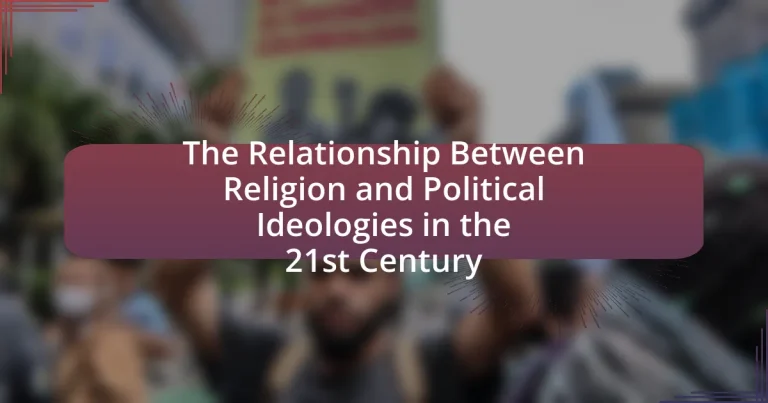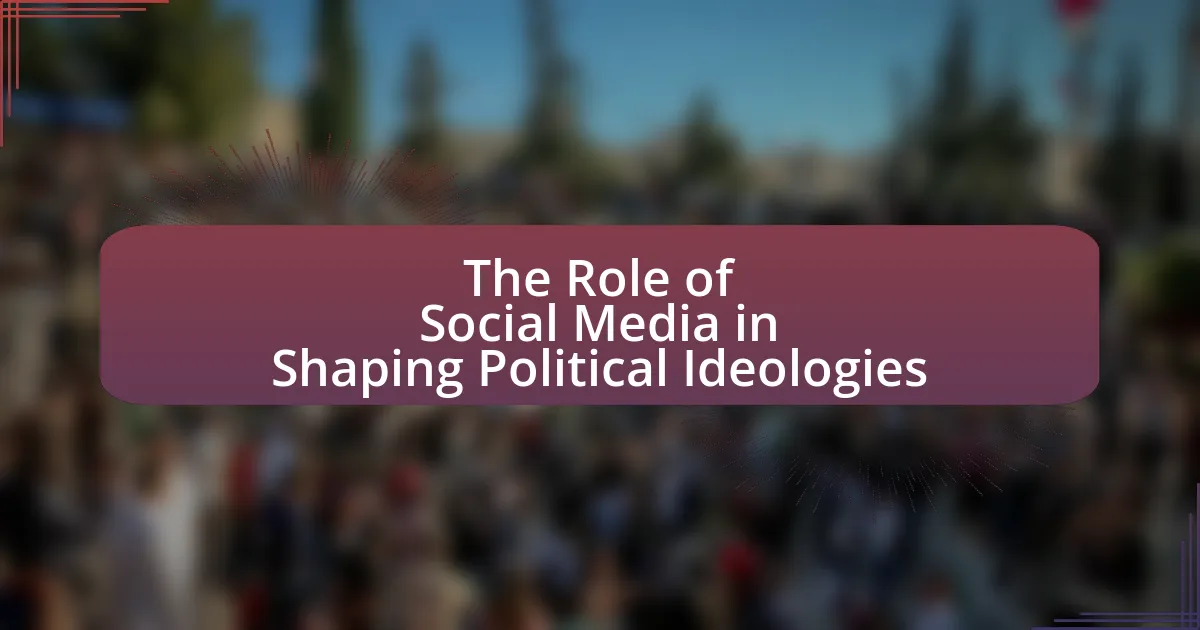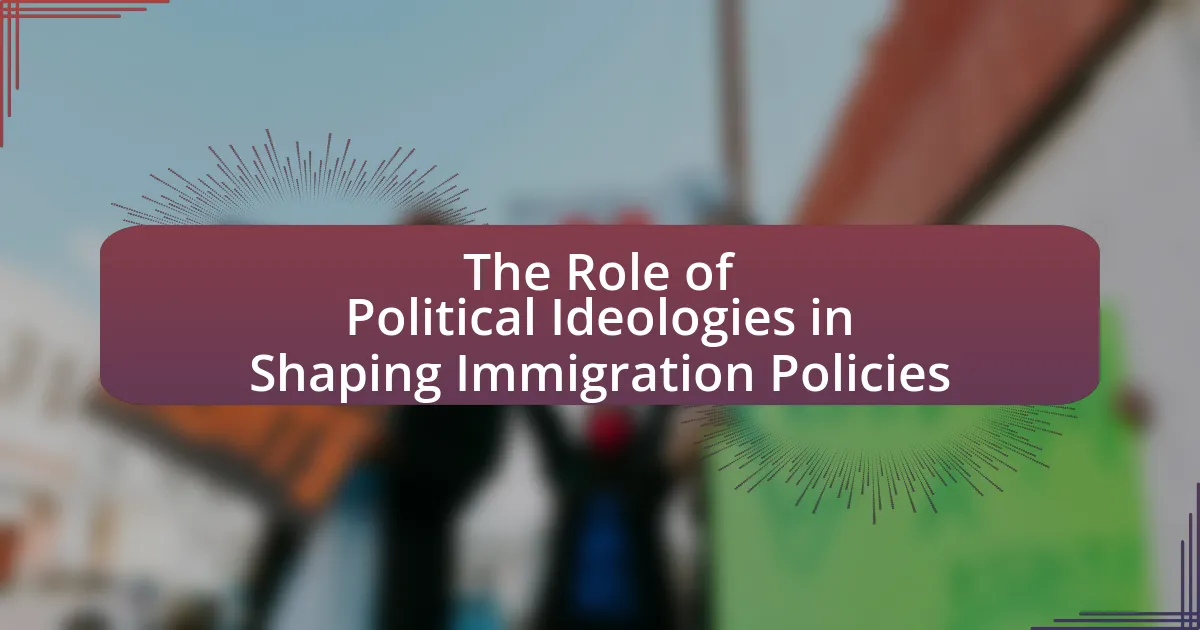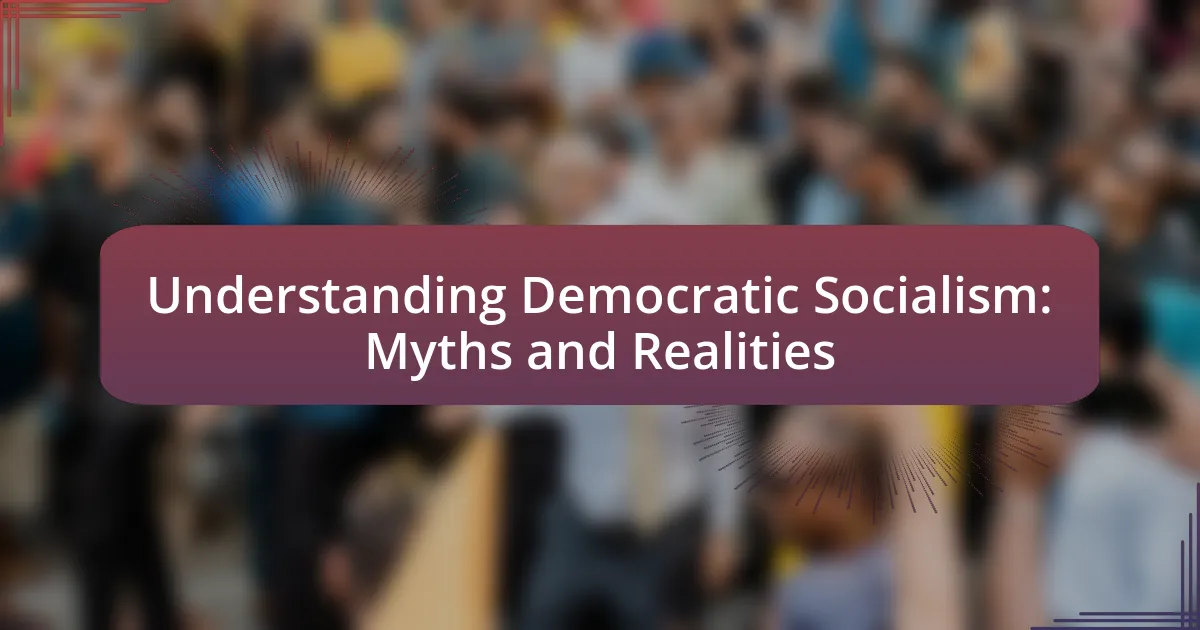The article examines the intricate relationship between religion and political ideologies in the 21st century, highlighting how religious beliefs shape political views and policies globally. It discusses the influence of various religions, including Christianity, Islam, and Eastern religions, on contemporary governance and political movements. Key themes include the role of religious groups in political processes, the impact of religious extremism, and the importance of secularism in mitigating conflicts. The article also emphasizes the need for dialogue and understanding between diverse belief systems to promote social cohesion and stability in society.
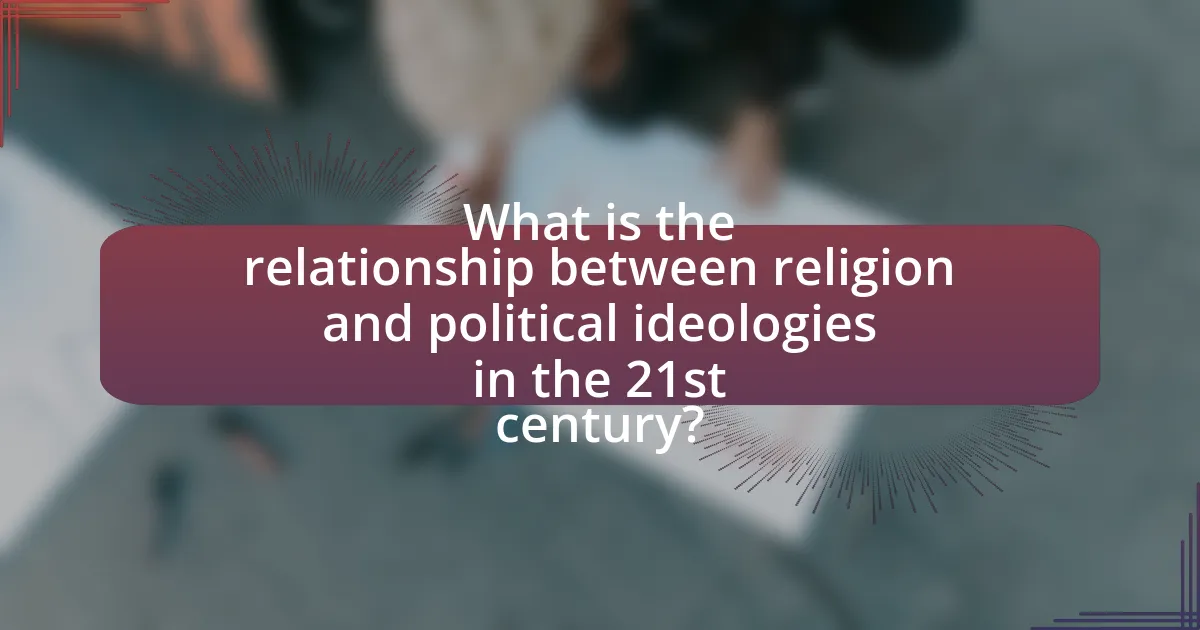
What is the relationship between religion and political ideologies in the 21st century?
The relationship between religion and political ideologies in the 21st century is characterized by a complex interplay where religious beliefs significantly influence political views and policies. For instance, in many countries, religious groups mobilize voters around specific issues such as abortion, marriage equality, and immigration, shaping the political landscape. In the United States, the rise of the Religious Right has demonstrated how evangelical Christianity can align with conservative political ideologies, impacting elections and legislation. Globally, movements like political Islam illustrate how religious ideologies can drive political agendas, as seen in countries like Iran and Turkey, where Islamic principles inform governance. This dynamic indicates that religion remains a potent force in shaping political ideologies and actions in contemporary society.
How do different religions influence political ideologies today?
Different religions significantly influence political ideologies today by shaping moral values, social norms, and policy preferences. For instance, Christianity often promotes social justice and welfare policies, as seen in the advocacy for healthcare and poverty alleviation by various Christian organizations. In contrast, Islamic teachings can impact political ideologies by emphasizing community welfare and governance based on Sharia law, which influences political movements in countries like Iran and Saudi Arabia. Additionally, Hindu nationalism in India has led to policies that prioritize Hindu cultural values, affecting the political landscape and minority rights. These examples illustrate how religious beliefs directly inform and guide political ideologies, shaping governance and societal structures across different regions.
What role does Christianity play in shaping modern political thought?
Christianity significantly influences modern political thought by providing ethical frameworks and moral principles that shape governance and social justice. The teachings of Christianity, particularly regarding human dignity, equality, and the common good, have informed democratic ideals and human rights discourses. For instance, the concept of the inherent worth of every individual, rooted in Christian doctrine, has been pivotal in advocating for civil rights and social reforms throughout history, as seen in movements led by figures like Martin Luther King Jr. This intertwining of faith and politics illustrates how Christian values continue to impact legislative processes and public policy debates in contemporary society.
How does Islam impact political movements in various regions?
Islam significantly influences political movements across various regions by shaping ideologies, mobilizing communities, and providing frameworks for governance. In the Middle East, for instance, political Islam has led to the rise of groups like the Muslim Brotherhood, which advocates for the integration of Islamic principles in governance, impacting political landscapes in countries such as Egypt and Tunisia. In South Asia, movements like Pakistan’s Jamaat-e-Islami promote Islamic law and social justice, affecting electoral politics and policy-making. Furthermore, in Africa, Islam has been a unifying force in movements against colonialism and oppression, as seen in the role of Islamic leaders in the independence movements of countries like Sudan and Algeria. These examples illustrate how Islam serves as both a source of identity and a catalyst for political action, influencing governance and societal norms in diverse contexts.
What influence do Eastern religions have on contemporary governance?
Eastern religions, such as Buddhism, Hinduism, and Confucianism, significantly influence contemporary governance by promoting values like social harmony, ethical leadership, and community welfare. For instance, Confucianism emphasizes the importance of moral integrity and benevolent governance, which has shaped political structures in countries like China, where leaders are expected to act in the interest of the people. Additionally, Buddhist principles of compassion and non-violence inform policies in nations like Bhutan, which prioritizes Gross National Happiness over GDP. These religions contribute to governance by fostering a sense of responsibility among leaders and encouraging policies that reflect communal well-being, thereby impacting legislative frameworks and societal norms.
Why is understanding this relationship important in today’s world?
Understanding the relationship between religion and political ideologies is crucial in today’s world because it influences social cohesion, policy-making, and conflict resolution. This relationship shapes the values and beliefs that guide political behavior and governance, impacting issues such as human rights, education, and public health. For instance, a Pew Research Center study found that religious beliefs significantly affect political attitudes and voting patterns in various countries, demonstrating how intertwined these elements are in shaping societal norms and policies. Recognizing this relationship allows for more informed dialogue and strategies to address global challenges, such as extremism and social inequality, thereby fostering a more stable and inclusive society.
How can the interplay between religion and politics affect social stability?
The interplay between religion and politics can significantly affect social stability by influencing governance, social cohesion, and conflict dynamics. When political leaders align closely with religious ideologies, they may enact policies that favor specific religious groups, leading to marginalization of others and potential social unrest. For example, in countries like Iran, the fusion of Islamic law with state governance has created a system that can suppress dissent and lead to civil unrest when citizens oppose religiously motivated policies. Conversely, inclusive political frameworks that respect religious diversity can enhance social stability by fostering dialogue and cooperation among different groups, as seen in countries like Canada, where multicultural policies promote harmony among various religious communities. Thus, the relationship between religion and politics is crucial in shaping the social fabric and stability of societies.
What implications does this relationship have for international relations?
The relationship between religion and political ideologies significantly influences international relations by shaping national policies and diplomatic interactions. For instance, countries with strong religious identities often align their foreign policies with their religious values, impacting alliances and conflicts. The rise of religious nationalism has led to increased tensions, as seen in the Middle East, where religious affiliations drive geopolitical rivalries. Additionally, the interplay between secular and religious ideologies can affect international cooperation on issues like human rights and climate change, as differing beliefs may hinder consensus. This dynamic is evident in the varying responses to global challenges, where religious perspectives can either foster collaboration or exacerbate divisions among nations.
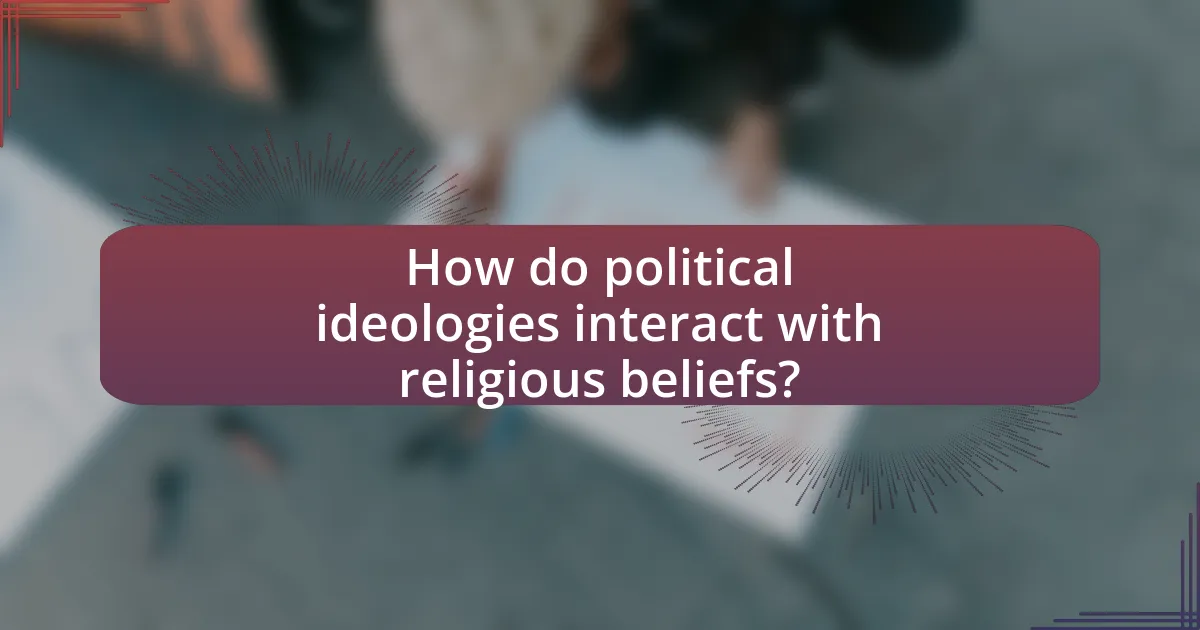
How do political ideologies interact with religious beliefs?
Political ideologies interact with religious beliefs by shaping the values and principles that guide individuals’ political actions and decisions. For instance, conservative ideologies often align with religious beliefs that emphasize tradition and moral values, leading to policies that reflect these principles, such as opposition to abortion and same-sex marriage. In contrast, progressive ideologies may advocate for social justice and equality, often drawing on religious teachings that promote compassion and inclusivity, influencing support for policies like universal healthcare and immigration reform. Historical examples include the role of the Christian Right in American politics, which mobilized religious voters around conservative issues, and the influence of liberation theology in Latin America, which integrated religious beliefs with social activism. These interactions demonstrate that political ideologies and religious beliefs can reinforce each other, shaping societal norms and public policy.
What are the main political ideologies influenced by religion?
The main political ideologies influenced by religion include theocracy, religious conservatism, and liberation theology. Theocracy is a system where religious leaders control the government, as seen in Iran, where Islamic law dictates political and social life. Religious conservatism emphasizes traditional values and often aligns with right-wing politics, evident in the influence of evangelical Christians in the United States on policies regarding family and social issues. Liberation theology, primarily associated with Latin American Catholicism, advocates for social justice and political activism based on religious principles, aiming to address poverty and inequality. These ideologies demonstrate how religious beliefs shape political structures and policies globally.
How does conservatism align with religious values?
Conservatism aligns with religious values primarily through its emphasis on tradition, moral order, and community. This alignment is evident in the conservative advocacy for family structures, social stability, and adherence to religious teachings, which are often viewed as foundational to societal well-being. For instance, many conservative movements in the United States and Europe draw heavily on Judeo-Christian principles, promoting policies that reflect these values, such as opposition to abortion and same-sex marriage. Research by the Pew Research Center indicates that individuals who identify as conservative are more likely to attend religious services regularly, reinforcing the connection between conservative ideology and religious practice.
What is the relationship between liberalism and secularism?
Liberalism and secularism are closely related, as both advocate for individual freedoms and the separation of religion from state affairs. Liberalism promotes personal liberties, equality, and democratic governance, while secularism seeks to ensure that religious institutions do not influence governmental policies. This relationship is evident in many liberal democracies, where secularism is often a foundational principle that supports the liberal framework by protecting the rights of individuals regardless of their religious beliefs. Historical examples include the establishment of secular laws in Western nations during the Enlightenment, which reinforced liberal ideals by promoting freedom of thought and expression without religious interference.
How do religious groups engage in political processes?
Religious groups engage in political processes primarily through advocacy, lobbying, and mobilization of their members. These groups often form coalitions to influence legislation, promote social issues aligned with their beliefs, and participate in electoral campaigns. For instance, organizations like the Christian Coalition in the United States have historically mobilized voters around specific issues such as abortion and marriage, demonstrating their impact on political outcomes. Additionally, religious leaders frequently use their platforms to encourage civic participation, urging congregants to vote or engage in community activism, which further integrates religious perspectives into the political landscape.
What strategies do religious organizations use to influence policy?
Religious organizations influence policy through advocacy, lobbying, grassroots mobilization, and coalition-building. Advocacy involves promoting specific issues aligned with their beliefs, often through public statements and campaigns. Lobbying is conducted by engaging directly with policymakers to persuade them to support legislation that reflects religious values. Grassroots mobilization entails rallying community members to participate in political processes, such as voting or attending town hall meetings, thereby amplifying their collective voice. Coalition-building occurs when religious groups partner with other organizations, enhancing their influence by presenting a united front on shared issues. For instance, the Faith and Politics Institute has successfully mobilized religious leaders to advocate for social justice legislation, demonstrating the effectiveness of these strategies in shaping public policy.
How do faith-based initiatives shape public opinion and legislation?
Faith-based initiatives significantly shape public opinion and legislation by mobilizing religious communities to advocate for specific social issues. These initiatives often leverage the moral authority of religious beliefs to influence public discourse, encouraging followers to engage in political activism. For instance, organizations like the Faith and Politics Institute have successfully lobbied for policies on social justice, healthcare, and poverty alleviation, demonstrating the tangible impact of faith-based advocacy on legislative outcomes. Research indicates that 70% of Americans believe that faith-based organizations play a crucial role in addressing social issues, highlighting their influence on public sentiment and policy-making.
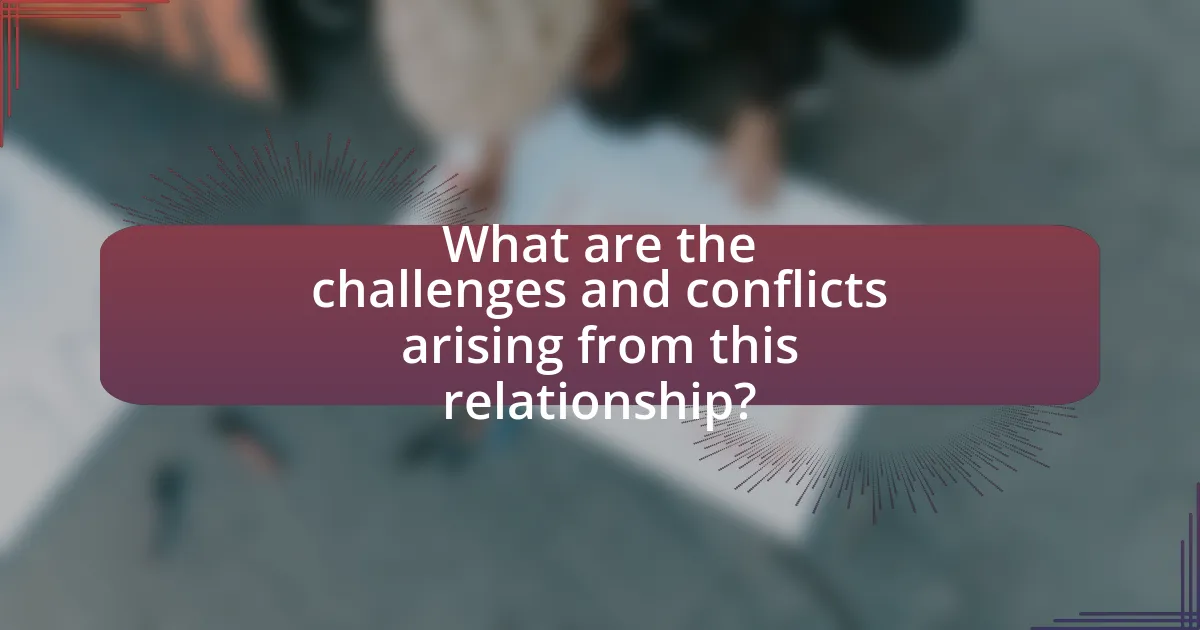
What are the challenges and conflicts arising from this relationship?
The challenges and conflicts arising from the relationship between religion and political ideologies in the 21st century include ideological polarization, social division, and the potential for violence. Ideological polarization occurs when differing religious beliefs lead to extreme political views, creating a fragmented society. Social division manifests as communities become segregated along religious lines, undermining social cohesion. Additionally, historical instances, such as the rise of religious extremism, demonstrate how religious motivations can fuel political violence, as seen in various global conflicts where religious identity plays a central role, such as in the Middle East. These factors illustrate the complex interplay between religion and politics, highlighting the potential for conflict in contemporary society.
What are the main sources of tension between religion and politics?
The main sources of tension between religion and politics include differing moral frameworks, the influence of religious institutions on political decisions, and the struggle for power and authority. Differing moral frameworks arise when religious beliefs conflict with secular laws, leading to debates on issues such as abortion and same-sex marriage. The influence of religious institutions can lead to political decisions that favor specific religious ideologies, undermining the principle of separation of church and state. Additionally, the struggle for power and authority often manifests in political movements that seek to impose religious beliefs on the broader society, creating friction between secular governance and religious mandates. These tensions are evident in various global contexts, such as the role of Islamic law in governance in some Middle Eastern countries and the influence of evangelical groups in American politics.
How do religious extremism and political radicalism intersect?
Religious extremism and political radicalism intersect through shared ideologies that promote violence and intolerance to achieve specific goals. Both movements often exploit grievances, such as social injustice or perceived threats to identity, to mobilize followers. For instance, groups like ISIS combine religious narratives with political objectives, aiming to establish a caliphate while justifying violent acts as divinely sanctioned. This intersection is evident in various global conflicts, where religious rhetoric is used to legitimize political violence, as seen in the rise of far-right movements that invoke religious symbols to further nationalist agendas.
What role does secularism play in mitigating conflicts?
Secularism plays a crucial role in mitigating conflicts by promoting a neutral public sphere where diverse beliefs can coexist without state endorsement of any religion. This separation of religion from government reduces the likelihood of sectarian violence and discrimination, as policies are based on universal principles rather than specific religious doctrines. For instance, countries with strong secular frameworks, such as France and Turkey, have historically experienced fewer religiously motivated conflicts compared to nations where religion heavily influences governance, like Iran. By ensuring equal treatment of all citizens regardless of their religious affiliations, secularism fosters social cohesion and stability, thereby decreasing the potential for conflict.
How can societies navigate the complexities of religion and politics?
Societies can navigate the complexities of religion and politics by promoting dialogue and understanding between diverse belief systems and political ideologies. Encouraging open discussions allows individuals to express their views while fostering respect for differing perspectives. For instance, countries like Canada have implemented policies that support multiculturalism and interfaith dialogues, which have contributed to social cohesion and reduced tensions. Additionally, establishing legal frameworks that separate religious institutions from state governance can help mitigate conflicts, as seen in secular nations like France, where the principle of laïcité maintains a clear boundary between religion and public policy. These approaches demonstrate that constructive engagement and clear separation can effectively address the intricate relationship between religion and politics.
What best practices can promote harmony between diverse beliefs and political systems?
Best practices that can promote harmony between diverse beliefs and political systems include fostering open dialogue, encouraging mutual respect, and implementing inclusive policies. Open dialogue allows individuals from different backgrounds to share their perspectives, which can lead to greater understanding and reduced tensions. Encouraging mutual respect involves recognizing the validity of differing beliefs and political views, which can help to create a more tolerant society. Implementing inclusive policies ensures that all groups have a voice in the political process, thereby reducing feelings of marginalization and promoting cooperation. These practices are supported by research indicating that societies with higher levels of dialogue and inclusivity tend to experience lower levels of conflict and greater social cohesion.
How can dialogue between religious and political leaders foster understanding?
Dialogue between religious and political leaders can foster understanding by creating a platform for shared values and collaborative problem-solving. This interaction allows leaders to address common societal issues, such as poverty and injustice, through a lens that incorporates both moral and civic perspectives. For instance, initiatives like the Interfaith Dialogue on Climate Change demonstrate how religious leaders can influence political agendas, leading to policies that reflect ethical considerations alongside scientific data. Such collaborations have been shown to enhance community cohesion and reduce conflict, as evidenced by the success of interfaith councils in various countries that have mediated tensions and promoted peace.
What practical steps can individuals take to engage with this relationship?
Individuals can engage with the relationship between religion and political ideologies by actively participating in interfaith dialogues and community discussions. These platforms allow individuals to share perspectives, understand differing beliefs, and foster mutual respect. Research indicates that interfaith engagement can reduce prejudice and promote social cohesion, as seen in studies conducted by the Pew Research Center, which found that communities with higher levels of interfaith interaction report greater tolerance and understanding. Additionally, individuals can educate themselves on the historical and contemporary impacts of religion on political ideologies through reading scholarly articles and attending lectures, which enhances their awareness and ability to contribute meaningfully to discussions on this topic.
